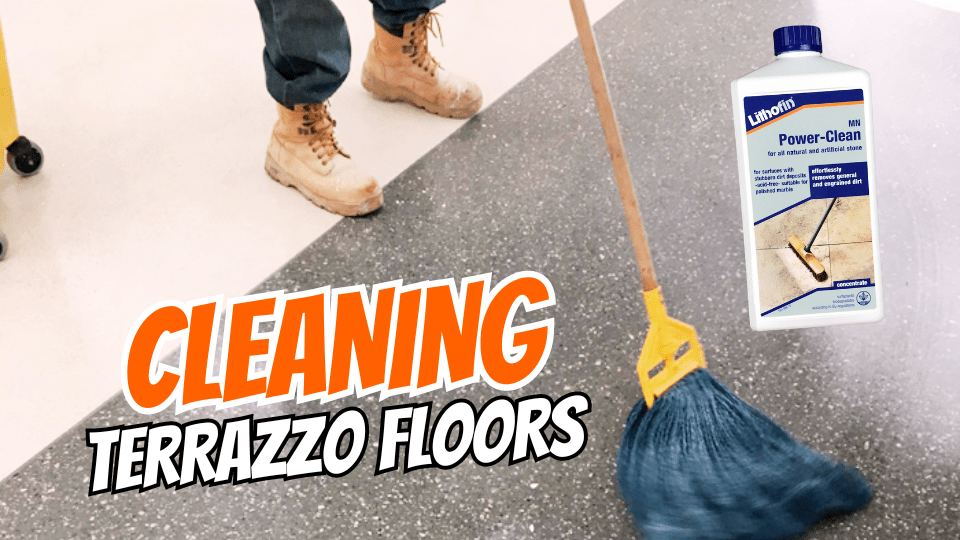Cleaning Terrazzo Floors, use a neutral pH cleaner diluted in warm water for spot cleaning stubborn stains and scuff marks. Always follow manufacturer’s instructions for proper usage and let the floor cleaner dwell for the appropriate time.
Terrazzo floors are known for their elegance and durability, making them a popular choice in many homes and commercial spaces. However, proper maintenance is essential to preserve their beauty and extend their lifespan. Regular cleaning and proper care are key to keeping terrazzo floors looking great.
Knowing the right products to use and what to avoid is crucial in maintaining the luster of terrazzo floors. By following the correct cleaning techniques, you can ensure that your terrazzo floors remain in pristine condition for years to come.

Understanding Terrazzo Floors
To effectively clean terrazzo floors, use a neutral-pH cleaner diluted in warm water to remove stains and scuff marks. Follow the manufacturer’s instructions for proper usage and let the cleaner sit for the recommended time. To maintain the integrity of the terrazzo, avoid using ammonia, acid-based detergents, and harsh scrubbing pads.
Common Issues Faced
Cleaning Terrazzo Floors
Terrazzo floors are known for their durability and timeless beauty. Proper cleaning techniques are crucial for maintaining their luster and longevity. From spot cleaning with a neutral pH cleaner to grinding and polishing for restoration, employing the right methods is essential for preserving their aesthetic appeal.
Spot Cleaning With Neutral Ph Cleaner
Spot cleaning with a neutral-pH cleaner diluted in warm water is highly effective for dealing with stubborn stains and scuff marks on terrazzo floors. Always adhere to the manufacturer’s instructions for proper dilution and usage. Allow the floor cleaner to dwell for the specified duration before rinsing.
Grinding And Polishing For Restoration
Grinding and polishing are indispensable to revitalize the appearance of terrazzo floors. Begin by using coarse-grit diamond tooling to eliminate scratches and scuff marks, followed by medium-grit and fine-grit diamond tooling to achieve a high-gloss finish. This restoration process helps restore the floor’s original luster and elegance.
Products To Use And Avoid
When it comes to cleaning terrazzo floors, it is crucial to use the right products to maintain their beauty and longevity. Using safe cleaning products and avoiding harmful ones can make a significant difference in their appearance and durability.
Safe Cleaning Products
When cleaning terrazzo floors, it is best to use mild, pH-neutral cleaners specifically formulated for stone surfaces. These products are gentle enough to effectively clean the floors without damaging the terrazzo.
Here are some safe cleaning products suitable for terrazzo floors:
- Neutral pH cleaners: These cleaners are gentle and effective in removing dirt and grime without harming the terrazzo surface.
- Mild soap: A mild, natural soap can be used to clean terrazzo floors, providing a gentle cleaning solution.
- Stone-specific cleaners: Look for cleaners designed specifically for natural stone or terrazzo to ensure safe and effective cleaning.
Products To Avoid
It is equally important to know the products that should be avoided when cleaning terrazzo floors. Certain cleaning solutions and tools can cause irreparable damage to the terrazzo, leading to deterioration and loss of aesthetics.
Here are some products to avoid using on terrazzo floors:
- Ammonia-based cleaners: Avoid using cleaners containing ammonia, as they can cause etching and dulling of the terrazzo surface.
- Acidic cleaners: Acid-based cleaners can damage the terrazzo and should be avoided to prevent degradation of the stone chips.
- Coarse scrubbing pads: Using abrasive scrubbing pads can scratch and wear down the terrazzo, compromising its appearance and integrity.
- Alkaline strippers: These products are too harsh for terrazzo and can lead to the deterioration of the stone chips, diminishing the quality of the flooring.
Maintenance Tips
Proper maintenance is key to preserving the beauty and longevity of your terrazzo floors. By following a regular cleaning routine and taking special care when dealing with heavily soiled areas, you can ensure that your floors remain in top condition for years to come.
Weekly Cleaning Routine
1. Damp Mopping:
- Use a neutral pH cleaner diluted in warm water for regular mopping.
- Follow the manufacturer’s instructions for proper dilution and usage.
- Allow the floor cleaner to dwell for the recommended time before mopping.
Special Care For Heavily Soiled Floors
1. Mechanical Buffing:
- Utilize a mechanical buffing machine with a neutral cleaner for heavily soiled areas.
- Scrub the affected area, ensuring to mop up all residue with clean water before the floor dries.
- 2. Spot Cleaning:
- Spot clean stubborn stains and scuff marks with a neutral pH cleaner diluted in warm water.
Common Mistakes To Avoid
When cleaning terrazzo floors, it’s important to be aware of common mistakes that can damage the surface and diminish its appearance. By avoiding these pitfalls, you can maintain the beauty and longevity of your terrazzo floors for years to come.
Avoiding Acidic Cleaners
One common mistake to avoid is using acidic cleaners on terrazzo floors. These cleaners can cause damage by etching the surface and dulling the finish over time. Instead, opt for neutral pH cleaners that are gentle on the terrazzo while effectively removing dirt and grime.
Preventing Surface Dulling
Another mistake to steer clear of is failing to prevent surface dulling. Abrasive materials and improper cleaning techniques can scratch the terrazzo and diminish its shine. Regular maintenance, such as gentle mopping and avoiding harsh chemicals, can help preserve the luster of your terrazzo floors.
Frequently Asked Questions
What’s The Best Thing To Clean Terrazzo Floors With?
Clean terrazzo floors with a neutral pH cleaner diluted in warm water to remove stains and scuff marks. Remember to follow the manufacturer’s instructions for proper dilution and usage. Let the cleaner sit for the recommended time.
What Not To Use On Terrazzo Floors?
Do not use ammonia and acid-based detergents or alkaline strippers on terrazzo floors. These products can contribute to the deterioration of the terrazzo stone chips. Also, avoid using vinegar as it can dull the surface and cause etching. Instead, spot clean with a neutral pH cleaner diluted in warm water and follow the manufacturer’s instructions for proper usage.
Use coarse-grit diamond tooling to remove scratches and scuff marks and achieve a high-gloss finish.
How Do You Make Terrazzo Floors Look New?
To make terrazzo floors look new, grind the surface with coarse-grit diamond tooling, then polish with medium-grit and fine-grit tooling and resin pads for a high-gloss finish. Avoid using ammonia, acid-based detergents, and vinegar, which can damage the terrazzo.
Regularly clean with a neutral pH cleaner.
Is Vinegar Good To Clean Terrazzo Floors?
Yes, vinegar should not be used to clean terrazzo floors, as its acidic properties can dull the surface and cause etching.
How To Clean Terrazzo Floors Effectively?
To clean terrazzo floors effectively, spot clean with a neutral pH cleaner diluted in warm water.
What Cleaning Products Should Be Avoided On Terrazzo Floors?
Avoid using ammonia, acid-based detergents, coarse scrubbing pads, and alkaline strippers on terrazzo floors.
Conclusion
Cleaning terrazzo floors requires special attention and care to preserve their beauty and durability. Using the wrong cleaning products or tools can cause irreversible damage to the terrazzo surface. Following the manufacturer’s instructions is important and avoiding using acidic or alkaline cleaning solutions, coarse scrubbing pads, or vinegar.
Regular maintenance with a neutral pH cleaner and weekly damp mopping can keep your terrazzo floors looking great for years to come. Always take precautions when cleaning and restoring your terrazzo floors to ensure they remain in top condition.


